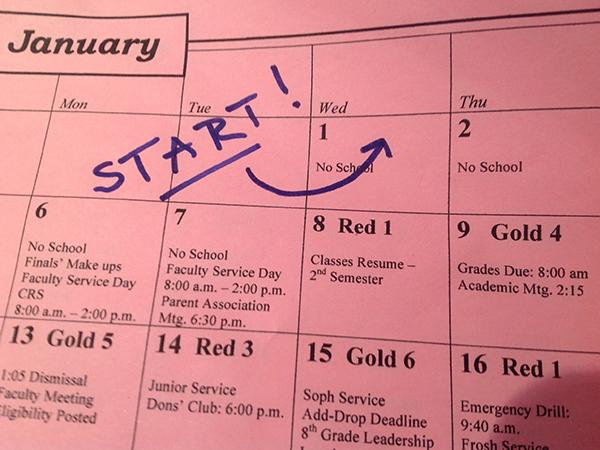The onset of a new year brings hopes and plans for self-betterment in the common form of resolutions. According to the New York Times, approximately 85% of New Year’s resolutions include getting into shape, saving money, and quitting bad habits such as smoking.
Common resolutions among students are getting organized and raising grades. “My new year’s resolution is to plan my schedule better so that I can stay organized and on top of everything,” said Cathedral senior, Michael Fee.
As many as 100 million Americans make resolutions at the start of each year; however, a recent Forbes study deduced that just 8% of people in America actually end up achieving their desired goals. That leaves 92% of the population not living up to the fullest potential, and failing to achieve their pursuits. Why, you may be wondering, does this happen? Inevitably, both a lack of motivation and unbreakable habits lead to failed goals.
However, that is not to discourage people from creating resolutions for self-betterment in the New Year. Benjamin Franklin’s words, “If you fail to plan, you plan to fail”, are true – people who make resolutions tend to have increased motivation to achieve more than those who refuse to make them at all. The key to making resolutions come true is just to be reasonable.
The Huffington Post highlights five central mistakes that lead to failed goals: plans that are 1) not meaningful enough, 2) too vague, have 3) insufficient accountability, are 4) overly ambitious, or are 5) just unrealistic.
Additionally, here are 5 tips to help you follow through with your new year’s resolutions.
1. Have a Positive Attitude. “Success is 99% attitude and 1% aptitude.” When you change your attitude and outlook on life, and remind yourself that you are capable of anything and can achieve your goal, then you have already won half the battle. A positive attitude can work wonders and help determine your success.
2. Make a Dream Board. Keep your eyes on the prize by reminding yourself of how much you want the end product. Make a poster or Pinterest board filled with things you can buy with the money you save, different organization tips, or motivational quotes for whatever your resolution may be. Look at it often, especially when you are feeling demotivated.
3. Track your Progress. When you see that you have made improvement, it is much more motivating to continue working toward your goal. Keep a journal of changes you notice or ask family or close friends to tell you when they notice differences – it will help motivate you toward fulfilling your resolution.
4. Reward Yourself. Celebrate small victories and milestones by treating yourself to something that you want while on the road to achieving your goal.
5. Forgive Yourself. Remember that you are human, and prone to making mistakes. No matter what your resolution is, there will be times where you are going to mess up. What really defines you is how you accept those small mishaps – let them serve as reminders of what not to do rather than to choosing to quit in frustration. In a study that John Norcross, author of Changeology: 5 Steps to Realizing Your Goals and Resolutions conducted, 70% of people who slipped up the first time said it made their resolutions stronger in the long run.
The start of a new year is the perfect time to make goals for self-improvement. Keeping realistic expectations and having a feasible plan of action are the first two steps to making your 2014 self the best it can be.






















































